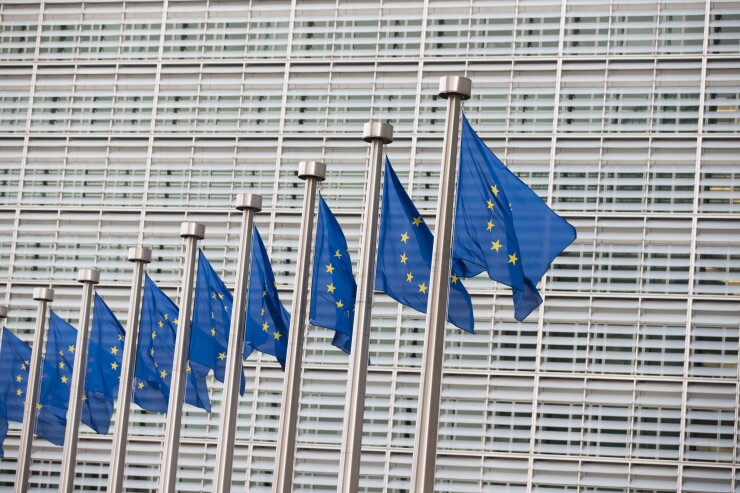
The countries that lead the world in real-time payments typically owe that to a mandate that requires banks to support instant settlement, a path the European Union hopes to replicate through the Instant Payments Regulation.
Under the IPR, which the European Parliament adopted in March 2024, banks must be able to receive real-time payments by Thursday and send payments by Oct. 9. Non-EU banks doing business in the EU must be able to receive real-time payments by Jan. 9, 2027, and send payments by July 9, 2027. Nonbank payment companies such as digital payment firms must be able to send and receive real-time payments by April 9, 2027.
The EU's regulation won't necessarily bring lots of new banks into the real-time payments market as much as it will make the environment simpler, according to Gareth Lodge, a senior analyst at Celent in London.
"Many European countries have had instant payments for many years. What this legislation does is make it mandatory for every bank, and by using the same rules," Lodge said. "This will certainly aid the growth of instant payments, as it provides ubiquity and consistency of experience, though there was already strong usage."
By having deadlines to support sending and receiving real-time payments, the IPR also addresses both sides of the transaction. In the U.S., some banks that receive real-time payments have been reluctant to
The lack of a mandate for "send and receive" has slowed the pace of growth of real-time payments in the U.S., according to Lodge, noting the existing U.S. regulations that apply to real-time payments allow banks to receive payments while not sending.
"That certainly has slowed take-up in the U.S. Someone has to send for someone to receive it after all," Lodge said. But that doesn't mean that real-time payments aren't catching on with consumers in the U.S., Lodge said, noting
IPR could also encourage growth for certain types of payments, including account-to-account transactions that do not require a card network.
Also called

European Payments Initiative completes first e-commerce transaction
The European Payments Initiative, a bank-backed venture designed to compete against Visa and Mastercard, completed its first e-commerce transaction late last year ahead of a wider rollout that's expected later in 2025.
The proof-of-concept
Additional trials will be conducted over the first half of 2025, with an expected official launch in Germany this summer. A Belgian launch will follow in the fall, and rollout will begin in France at the beginning of 2026.
Further trials will be conducted throughout the first half of the year before the launch in Germany.
"Wero will allow consumers to pay at e-commerce merchants directly with their bank account, without any intermediary or additional payment means," according to

ABN Amro's mobile payments app is flush with success
A lack of public toilets in the Netherlands helped payments app Tikkie to process $7.7 billion via 157 million payment requests in 2024, a record for the ABN Amro unit. Tikkie, ABN Amro's payments app, processed a record $7.7 billion in 2024, totaling 157 million payment requests. The numbers were boosted in part by the lack of public facilities in the Netherlands. The app, which was launched in 2016, is free to anyone with a Dutch bank account and enables users to send payment requests using WhatsApp, Messenger, SMS text, a QR code and other digital options.
The primary use for the requests, called Tikkies, was to split payments for dinners, groceries and lunches. But the bank said more than 1 million requests in 2024 were less than 1 euro, primarily to pay to use toilets.
The Netherlands almost universally requires people to
There's a large boost in payments during King's Day, a national holiday that celebrates the Dutch monarchy, with the bank specifically mentioning restrooms as a major use case for the payment app, the bank reported
The ABN Amro app also gets a boost through another old-school method, refunding payments for people who return recyclable beverage bottles.
"A million people have already received direct refunds on their bottle deposits via Tikkie," said Moreno Kensmil, head of marketing for Tikkie, in a release. "As more places around the Netherlands have deposit return machines with Tikkie QR codes, including at schools and railway stations, near fast-food outlets and in garden centres, this makes it easier for people to return their reusable containers and get their money back quickly, while at the same time helping to keep the world around them clean." —John Adams

Visa partners with UAE-based spend management platform
Visa is partnering with United Arab Emirates-based spend management platform Qashio to launch a business-to-business travel payments program called Visa Commercial Choice Travel, according to a release
The program will allow travel companies to obtain Qashio cards and transact in different currencies, such as the United Arab Emirates dirham, the Saudi riyal, the U.S. dollar, the euro and British pound sterling. Travel companies will be able to digitize and automate travel payments.
Visa and Qashio will invest 100 million United Arab Emirates dirham ($27.2 million) in the coming years to offer services in the UAE, the Middle East, North Africa, Europe and the United Kingdom, according to the release.
"We recognise that the travel and tourism industry is key in the region. However, the travel companies are underserved with strong technical payment solutions that work in their favor. We are creating a one-stop platform that simplifies the corporate travel experience for our clients, allowing them to focus on what truly matters — growing their businesses," said Armin Moradi, CEO and co-founder of Qashio, in a statement. —Joey Pizzolato

Paysafe bets on Brazilian gaming market
Brazil's central bank has given Paysafe a payments institution license in anticipation of the country's online sports-betting market, which is expected to be the largest in Latin America when it's launched later this year.
The London-based digital payments company will be able to expand partnerships with digital gaming companies and will also enable Paysafe to sell nongaming payment processing to merchants and e-commerce sellers in Brazil.
Paysafe launched an account-to-account payments option for digital gaming systems in April, enhancing an existing digital gambling payments business that is live in more than 90 countries.
"With this expansion, Paysafe is poised to better serve the Brazilian market with payment solutions, including the regulated Brazilian iGaming market, which will mark a new era for not only Latin American gaming but also the global space, with the country becoming the third largest betting jurisdiction on earth," said Rob Gatto, chief revenue Officer at Paysafe.
Supporting
But that growth has also come with risk, as

Verifone, FreedomPay team to cross-sell payment tech
Verifone and FreedomPay have integrated their technology ecosystems, combining Verifone's roster of merchant-focused products with FreedomPay's payment orchestration platform.
In an
Verifone, along with rivals such as Diebold Nixdorf and NCR, in recent years has expanded beyond
Integrating Verifone's full line of payment devices allows FreedomPay to provide its merchants with greater flexibility and the latest in payment technology, said Tom Durovsik, founder & CEO of FreedomPay,

Uruguay-based payments provider considers sale
Uruguay-based payments provider DLocal is mulling a potential sale,
The Latin American company has solicited Morgan Stanley to gauge interest from buyers, which potentially include private-equity firms and large fintechs. The move marks the company's second attempt at a sale, Reuters said, following an attempted sale in 2024 that fell apart when the parties could not agree on financial terms.
DLocal processed $17.7 billion worth of payments in 2023. It has more than 800 team members and works with over 600 merchants across more than 40 countries, according to its website. —Joey Pizzolato

Nordic software provider completes verification of Payee
Finnish banking-as-a-service provider Tietoevry Banking has partnered with a Swedish payments fintech to offer confirmation of payee services to banks and financial institutions in the European Union.
Confirmation of Payee is a security feature that checks the name of the recipient of a payment with the sender to ensure that the payment is going to the intended recipient. CoP implementation has been mandated in the single European payments region by October 2025, following Thursday's deadline that banks in the EU accept receipt of instant payments.
CoP has gained momentum in tandem with instant payments, which are hard, if not impossible,
"Instant Payments Regulations have presented some implementation challenges for banks, especially as they prepare for the arrival of the EU's third payment services directive, expected before 2027," said Anders Olofsson, head of sales for payments and cash management at Tietoevry Banking, in a statement. "The registration we are announcing today empowers us to manage requests to verify payer and payee identities on behalf of banks, as well as responses." —Joey Pizzolato





